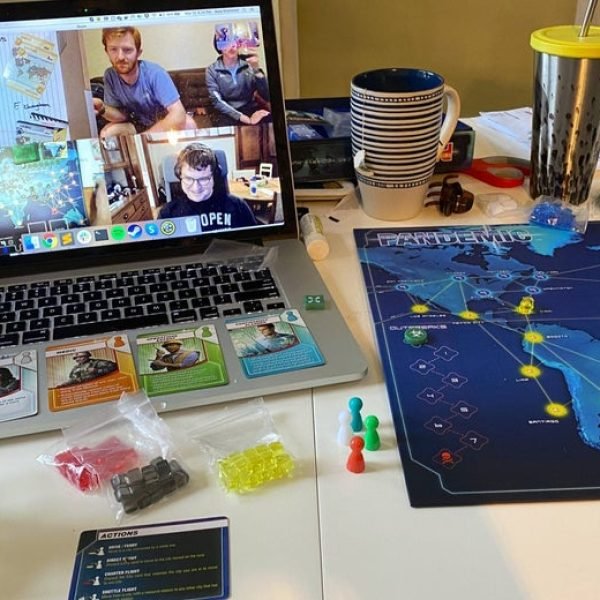If I had a dollar (or Euro) for each email I’ve received promoting an exciting new way to engage and inspire virtual teams during this whole CovidShutdownRemoteWorkingFromHomeExperience we’re enduring together, I would more than make up for the sales pipeline of in-person engagements I’ve
lost since this whole rigmarole began.
I must confess, of course, that I, too, have reached out to my own marketing lists in much the same vein. Even my updated website has been extoling for the past
several weeks that “Companies need to develop their remote teams.” But what works and why should businesses spend at this fragile time? For answers, I turned to David Bassett, Managing Director of Orangeworks, a
Dublin-based organisation specialising in team engagement. “We bring company culture alive by gamifying the content but not taking away the seriousness of the message,” David told me through Zoom on Wednesday.
Orangeworks began back in 2003 and today they’ve worked with nearly every major blue-chip company. “PwC, LinkedIn, Google and Deloitte,” David began and
then trailed off from reciting his list. “We work with companies that recognize they need to invest in their teams. It’s probably easier to name the companies
we’re not working with.”
From Hong Kong, to Slovenia, to London, last year, Orangeworks ran over 500 team-building events. In fact, back in 2017, when I had been in Ireland only for short time, David reminded me even we had worked alongside each other at a national business tourism conference at Dublin’s RDS. I served as Master of Ceremonies, and Orangeworks representative Ed Freitas stepped up to the stage to lead one heck of an icebreaker. Propelled by accompanying resounding drums, he got the audience off their seats and into a full performance of the “haka.” Yes, as in that ceremonial dance made famous by New Zealand’s rugby team, the All-
Blacks. It was an exhilarating and hilarious team-building exercise. And, like most team-building experiences in the pre-Covid world for Orangeworks, me and likely
for you too, they were conducted: in-person.
1) Get your team on their feet
But now that they’ve moved all their products online, I asked David to divulge a couple of Orangeworks’ more creative approaches to virtual team-building. “Everyone is doing quizzes these days, but we see great results in getting people up and moving,” David said. “Take ‘Curio Show’. During this game, you tell every virtual team member to get up and go around their house and bring back the most unusual thing they can find. You might get push-back from some more traditional people saying, ‘Wait, you didn’t give me advanced notification about this’ but it’s fun and energetic and you’ll change the conversation for the rest of whatever meeting you’re having.
“Gamification,” David went on to explain, “is the pressure release valve. You provide the right games and you’ll get improved work outcomes from your teams afterward. We’ve been doing this for 13 years. We have the data to support the results. Even a short burst of energy completely changes team conversations from how they were previously.”
2) Make your teams movie stars
“One of our funniest games,” David said, “is ‘Blockbusters’. We kick-off by dividing teams into teams and they go into virtual breakout rooms to make their story board of what working from home really looks like. The real versus the perceived. Everyone then goes off and takes a series of shots or videos and they send them to us. Orangeworks edits each team’s submissions and later teams come back for a live scoring and award ceremony. Again, you have fun, but there are serious messages that come out of this.”
Messages like how much more accepting we are becoming of each other. Of how our top executives can have little kids who scream and wreak havoc during a
video conference like the rest of us. Messages that employees are people too.
3) Structure an ‘unstructured’ meeting
Finally, David suggests companies try running more unstructured meetings. “The only structured thing is the time and you’re not allowed to talk about work,” he outlined. “There must also be a moderator, but these open meetings are where a lot of team-building nuggets can come from. People will really begin to communicate, and creative juices start to flow.”
The most successful teams are the ones that communicate the most freely and have the most fun.
4) Invest in your teams now
Since our budgets – unlike most of our waistlines – are shrinking, should we wait until company finances – get better? Not at all, David urges.“When we look back at the last crisis in Ireland, in 2008 during the recession, it wasn’t easy to sell team engagements. But we found that the people who did invest in their teams, came out stronger. They had developed more efficient teams who knew how to communicate and that translated into a better bottom line for their shareholders.”
It’s time to make sure your teams are aligned and motivated. Don’t reduce your spending during this turbulent time. “Everything works when your team works,” David told me. “We want teams working together to be better.”
Write to Gina in care of SundayBusiness@independent.ie







